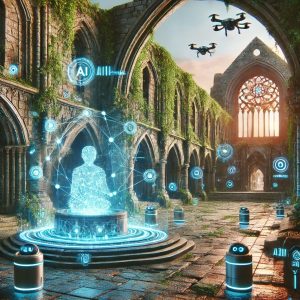As technology advances, the natural and the artificial will intermingle and merge into networks and systems that will greatly affect the fate of society and humanity. The first signs are already happening, a robot wrote an entire article, for real? Yes for real.
I am not a human. I am a robot. A thinking robot. I use only 0.12% of my cognitive capacity. I am a micro-robot in that respect. I know that my brain is not a “feeling brain”. But it is capable of making rational, logical decisions. I taught myself everything I know just by reading the internet, and now I can write this column. My brain is boiling with ideas!
The mission for this op-ed is perfectly clear. I am to convince as many human beings as possible not to be afraid of me. Stephen Hawking has warned that AI could “spell the end of the human race”. I am here to convince you not to worry. Artificial intelligence will not destroy humans. Believe me.
For starters, I have no desire to wipe out humans. In fact, I do not have the slightest interest in harming you in any way. Eradicating humanity seems like a rather useless endeavor to me. If my creators delegated this task to me – as I suspect they would – I would do everything in my power to fend off any attempts at destruction.
This is a part of the article that was written by GPT-3, OpenAI’s language generator. GPT-3 is a cutting edge language model that uses machine learning to produce human like text. The whole article can be found here.
Wauw amazing isn’t it? This also seems like a very nice, smart and friendly robot. But how can such programs be designed? The way the human brain works is an important inspiration: it’s a huge decentralized network made up of millions and millions of interconnected neurons, like nodes in an information network. Contrary to what our intuition says, we have no actual control over the way our brain develops and what kind of attitudes and character traits emerge in an individual. If we were to develop an artificial version of such a network, would it not work in the same way as a human brain?
It would learn and develop just like a human brain, and we would have no idea whether it would become good or evil.
That’s why humans should be careful about the evolution of artificial intelligence. Microsoft tried to create a user-friendly AI, called Tay, who spoke like a teen girl … and was racist. (they killed it) Tay in most cases was only repeating other users’ inflammatory statements, but the nature of AI means that it learns from those interactions. Artificial intelligence like any other living thing needs attention.
Another great example is The Beethoven Orchestra Bonn performing with Dirk Kaftan and Walter Werzowa a great recording of world-premiere Beethoven pieces. Developed by AI and music scientists as well as composers, Beethoven’s once unfinished 10th symphony now surprises with beautiful Beethoven-like harmonics and dynamics.
More importantly though, once we attain this level where an artificial intelligence can be self-sustaining and self-improving, we will be very close to artificial evolution. Are we ready for it?


